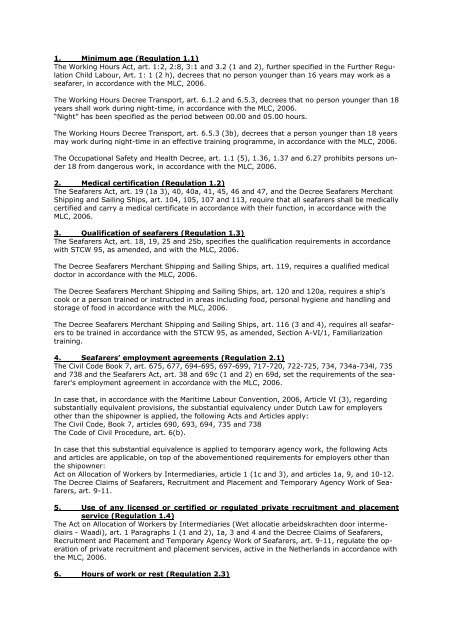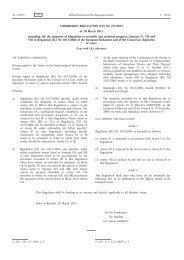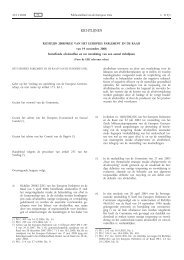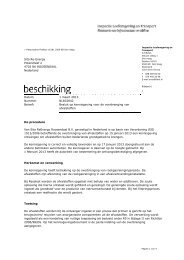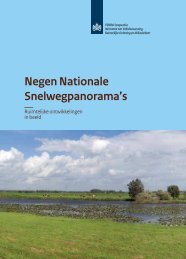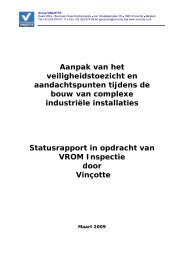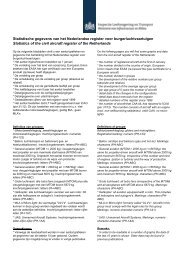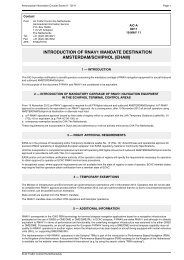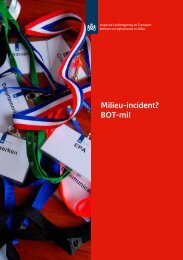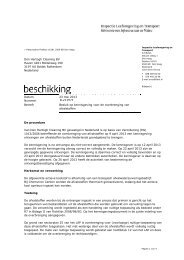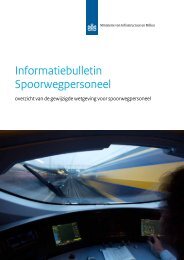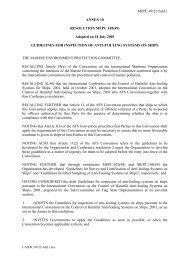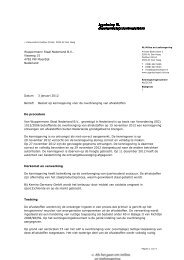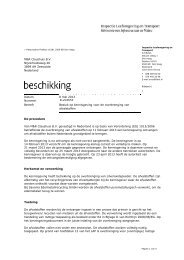DMLC part I, existing ships
DMLC part I, existing ships
DMLC part I, existing ships
Create successful ePaper yourself
Turn your PDF publications into a flip-book with our unique Google optimized e-Paper software.
1. Minimum age (Regulation 1.1)The Working Hours Act, art. 1:2, 2:8, 3:1 and 3.2 (1 and 2), further specified in the Further RegulationChild Labour, Art. 1: 1 (2 h), decrees that no person younger than 16 years may work as aseafarer, in accordance with the MLC, 2006.The Working Hours Decree Transport, art. 6.1.2 and 6.5.3, decrees that no person younger than 18years shall work during night-time, in accordance with the MLC, 2006.“Night” has been specified as the period between 00.00 and 05.00 hours.The Working Hours Decree Transport, art. 6.5.3 (3b), decrees that a person younger than 18 yearsmay work during night-time in an effective training programme, in accordance with the MLC, 2006.The Occupational Safety and Health Decree, art. 1.1 (5), 1.36, 1.37 and 6.27 prohibits persons under18 from dangerous work, in accordance with the MLC, 2006.2. Medical certification (Regulation 1.2)The Seafarers Act, art. 19 (1a 3), 40, 40a, 41, 45, 46 and 47, and the Decree Seafarers MerchantShipping and Sailing Ships, art. 104, 105, 107 and 113, require that all seafarers shall be medicallycertified and carry a medical certificate in accordance with their function, in accordance with theMLC, 2006.3. Qualification of seafarers (Regulation 1.3)The Seafarers Act, art. 18, 19, 25 and 25b, specifies the qualification requirements in accordancewith STCW 95, as amended, and with the MLC, 2006.The Decree Seafarers Merchant Shipping and Sailing Ships, art. 119, requires a qualified medicaldoctor in accordance with the MLC, 2006.The Decree Seafarers Merchant Shipping and Sailing Ships, art. 120 and 120a, requires a ship’scook or a person trained or instructed in areas including food, personal hygiene and handling andstorage of food in accordance with the MLC, 2006.The Decree Seafarers Merchant Shipping and Sailing Ships, art. 116 (3 and 4), requires all seafarersto be trained in accordance with the STCW 95, as amended, Section A-VI/1, Familiarizationtraining.4. Seafarers’ employment agreements (Regulation 2.1)The Civil Code Book 7, art. 675, 677, 694-695, 697-699, 717-720, 722-725, 734, 734a-734l, 735and 738 and the Seafarers Act, art. 38 and 69c (1 and 2) en 69d, set the requirements of the seafarer'semployment agreement in accordance with the MLC, 2006.In case that, in accordance with the Maritime Labour Convention, 2006, Article VI (3), regardingsubstantially equivalent provisions, the substantial equivalency under Dutch Law for employersother than the shipowner is applied, the following Acts and Articles apply:The Civil Code, Book 7, articles 690, 693, 694, 735 and 738The Code of Civil Procedure, art. 6(b).In case that this substantial equivalence is applied to temporary agency work, the following Actsand articles are applicable, on top of the abovementioned requirements for employers other thanthe shipowner:Act on Allocation of Workers by Intermediaries, article 1 (1c and 3), and articles 1a, 9, and 10-12.The Decree Claims of Seafarers, Recruitment and Placement and Temporary Agency Work of Seafarers,art. 9-11.5. Use of any licensed or certified or regulated private recruitment and placementservice (Regulation 1.4)The Act on Allocation of Workers by Intermediaries (Wet allocatie arbeidskrachten door intermediairs- Waadi), art. 1 Paragraphs 1 (1 and 2), 1a, 3 and 4 and the Decree Claims of Seafarers,Recruitment and Placement and Temporary Agency Work of Seafarers, art. 9-11, regulate the operationof private recruitment and placement services, active in the Netherlands in accordance withthe MLC, 2006.6. Hours of work or rest (Regulation 2.3)


